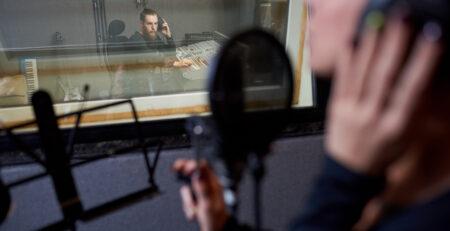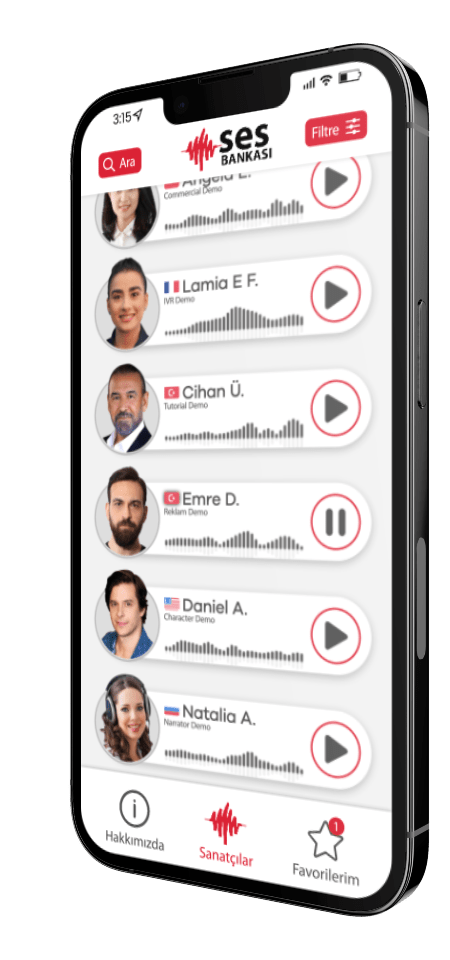I Want to Voice Over, What Should I Do?
Recently, the profession of "voicing" and "dubbing" has become even more remarkable, and with this popularity, it has started to bring up the issue of how the profession can be performed for those who want to do this profession. Therefore, an important agenda has emerged for those who say "I want to do a voiceover".
Voice-over and dubbing work is not only very enjoyable, but also one of the cool professions. So, can anyone do this job? Your friends and acquaintances say that your tone and speech are good. Are they the decision maker? So where and how should you start?
We tried to give answers to these and many other questions in this article. In our article, we will have a few suggestions for candidates who are interested in the art of voiceover and dubbing and want to have a profession in this field. However, it would be useful to know some basic principles about these arts beforehand. Because the definitions we have in voice and dubbing will be important steps in reaching the right result.
Voice Over and Dubbing Definitions
Dubbing; Advertising, promotional film, various announcements, documentary… In short, the work of giving a voice to a text that does not contain a character is called voice-over, the people who perform this work are called voice actors or voice actors. In other words, it is to give a voice to a scenario prepared for a brand, product and service. If we give an example of voice-over works, we can first talk about advertisements in audio and visual broadcasting channels. Many services such as announcements made at stations in air, sea and road transportation, telephone exchanges, cloud switchboards, announcements that provide customer management and guidance in ivr systems, announcements that welcome passengers waiting at traffic lights, and kiosk direction voice-overs have been voiced.
Dubbing; In content such as Films, TV Series, Animated Films, and some documentaries containing interviews, dubbing for re-talking the character, actors and actors, dubbing artists, voice actors, microphone actors, even dubbing is common to those who practice this profession. It is essential that the theatrical talent of the dubbing artist is at a high level and that he performs it in accordance with the accent, intonation and facial expressions of the character he is speaking with. Otherwise, a successful dubbing will not be mentioned and it will not be sincere.
If you want to start a voice-over and dubbing business and you have no experience, you should first consult with voice-over courses. However, your teachers or voice-over directors in your voice-over courses can determine whether you have talent in this regard and can direct you to a suitable dubbing studio or voice-over agency at the end of the course.
It should not be forgotten that there is no guarantee that everyone who graduates from voice and dubbing courses will do this job, only talented and successful ones take their place among the people that the studios include in their casts and sound banks.
I Want to Voice Over, But Where Do I Start?
Getting praise from your close circle about your tone does not mean that you will or can do this job. You get the entrance ticket to this profession in proportion to your talent registered by the voice-over director. The rest is perseverance, effort and hard work. However, if you do not have experience in this field and do not know how to start, you can first meet with voiceover courses that we can recommend to you.
There are no courses or training services in our agency. Voice-over courses will help you in technical details and how you should follow. However, apart from this, it is very important that you support your own development as an individual. There are several methods we can recommend for this development process.

Make sure to follow these 4 steps to make a voiceover
When we say I want to do a voiceover, as in any job, a study is necessary. Voice actors are people who use the best of their voices. In this regard, following the steps below will enable you to be more successful before the voice-over application and voice-over courses.
1. Practice reading aloud. Being able to read aloud effectively is essential to voice acting. Regularly read books, magazines or news aloud to be more comfortable. Spend at least 30 minutes a day practicing reading aloud. Work on your word pronunciation and intonation as you read. You can also try changing the color of your voice when reading for a challenge. Thus, you can discover different uses in your voice. You can also try to do some of these readings by holding a pencil in your mouth to prevent laziness of lips and tongue.
2. Record your voice. Try narrating a monologue or reading from a script while recording your voice. Then listen to your voice on the recording and take personal notes for improvements. Your own voice may surprise you! Do this every day, take note of the changes and get used to your recorded voice so you can express yourself effectively in front of the microphone.
3. Use your diaphragm. When listening to your voice, try to notice whether you are using a nose, mouth, chest, or diaphragm voice. nasal voice; an unpleasant and whining sound, Mouth voice; very quiet, Chest voice; pleasant, Diaphragm sound; It has the strongest and best sound.
Practice deep breathing and watch your stomach rise and fall to improve diaphragm sound. Remove sounds from the diaphragm, such as laughing or yawning. When you understand how to do it, the rest will develop with the continuity of your work. A voice teacher can help improve your ability to speak from the diaphragm.
Breathing techniques are very important for voice acting and dubbing. About breathing techniques Use Your Voice Correctly with Breathing Techniques: Five (5) Breathing Exercises Our content will help you with this.
4. Do vocal exercises. Some exercises can help you control and improve your voice. Many rely on breathing. You can try using a straw for breath control. You can lie down on the floor and breathe deeply, making a "shhh" sound as you exhale. Even simply sitting with your shoulders and back straight can make a big difference in your voice. You can also practice tongue slips and articulation with nursery rhymes.
Remember! Since the voice-over field is a very competitive industry, it will only be possible for you to stand out as a voice actor in this environment with perseverance, hard work and expertise. BiberSA Voice Bank If you want to take your place in it and trust your voice and most importantly your education, you can apply to us from the link below.



















